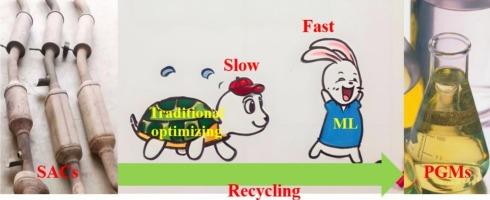Machine learning for efficient prediction and optimization of platinum group metal recovery from spent automotive catalysts
IF 7.1
2区 环境科学与生态学
Q1 ENGINEERING, ENVIRONMENTAL
引用次数: 0
Abstract
Spent automotive catalysts (SACs) represent a valuable resource for recycling platinum group metals (PGMs). Roasting pretreatment followed by acid leaching is a widely used process for this purpose. However, traditional optimizing methods are often challenged by the variable composition of waste feed and numerous process parameters. This necessitates extensive experiments, leading to increased costs and environmental risks. To overcome these issues, this study employed machine learning (ML) to enhance the recovery of PGMs from SACs. Based on a dataset of 18,877 collected data points, the model included 34 input features covering the waste properties and technological parameters. By comparing four ML algorithms, the extreme gradient boosting demonstrated superior predictive performance for PGMs leaching efficiency across training, testing, and 5-fold cross-validation. Feature importance analysis revealed the influence of the multiple parameters on PGMs leaching behaviors. Additionally, a user-friendly graphical user interface (GUI) was developed to enable the rapid prediction of PGMs leaching results solely by experimentally measuring the particle size and composition of the waste, thereby minimizing the need for repeated experimental optimization. Finally, the practicality and effectiveness of the GUI were confirmed through experimental validation. This study provides an intelligent and efficient strategy for PGMs recovery from SACs, which can enhance both economic efficiency and environmental sustainability.

从废汽车催化剂中回收铂族金属的有效预测和优化的机器学习
废汽车催化剂(SACs)是回收铂族金属(PGMs)的宝贵资源。焙烧预处理后再进行酸浸是一种被广泛采用的工艺。然而,传统的优化方法经常受到废料组成多变和工艺参数众多的挑战。这就需要进行大量的实验,从而导致成本和环境风险的增加。为了克服这些问题,本研究采用机器学习(ML)来增强SACs中pgm的恢复。该模型基于收集的18,877个数据点的数据集,包括34个输入特征,涵盖废物特性和技术参数。通过比较四种ML算法,极端梯度增强在训练、测试和5倍交叉验证中显示出优越的PGMs浸出效率预测性能。特征重要性分析揭示了多个参数对PGMs浸出行为的影响。此外,开发了一个用户友好的图形用户界面(GUI),仅通过实验测量废物的粒度和组成就可以快速预测PGMs浸出结果,从而最大限度地减少了重复实验优化的需要。最后,通过实验验证,验证了图形用户界面的实用性和有效性。该研究提供了一种智能、高效的从sac中回收pgm的策略,可以提高经济效率和环境可持续性。
本文章由计算机程序翻译,如有差异,请以英文原文为准。
求助全文
约1分钟内获得全文
求助全文
来源期刊

Waste management
环境科学-工程:环境
CiteScore
15.60
自引率
6.20%
发文量
492
审稿时长
39 days
期刊介绍:
Waste Management is devoted to the presentation and discussion of information on solid wastes,it covers the entire lifecycle of solid. wastes.
Scope:
Addresses solid wastes in both industrialized and economically developing countries
Covers various types of solid wastes, including:
Municipal (e.g., residential, institutional, commercial, light industrial)
Agricultural
Special (e.g., C and D, healthcare, household hazardous wastes, sewage sludge)
 求助内容:
求助内容: 应助结果提醒方式:
应助结果提醒方式:


